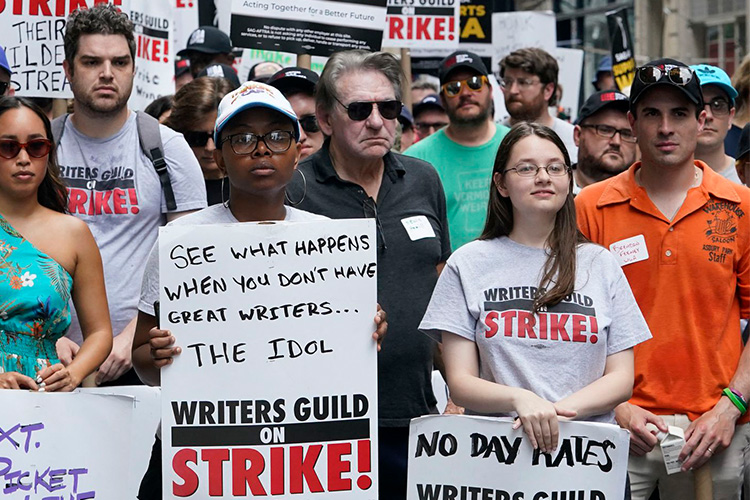
SAG-AFTRA on strike alongside the WGA to get better contract conditions. photo by Timothy Clary
A recent strike has put a hold on Hollywood productions until a resolution can be found.
Hollywood is at a crossroads, and not just about special effects or blockbuster hits. As the entertainment industry struggles with the rise of artificial intelligence, the Screen Actors Guild-American Federation of Television and Radio Artists (SAG-AFTRA) alongside the Writers Guild of America (WGA) are stepping onto the front lines in negotiations with the AMPTP. Will the Alliance of Motion Picture and Television Producers answer the call or will they risk losing the heart of the entertainment world to the cold calculations of machines?
Programs like ChatGPT can be used for intelligence related topics – school questions and work, etc, there’s Artificial Intelligence that can generate images based off of key words put in, or a certain style mentioned – some of which could be artsy or can create creepily realistic photos of a cat smoking a pipe during the civil war, there are even AI voice applications that can create songs or simple vocal manifestations of whatever words typed in. Despite all of these great inventions (and sometimes useless features), Hollywood’s biggest issue with advancing AI technology is the way it learns from previously published work. Give ChatGPT a writing prompt, and it’ll create a story. If a person were to give Midjourney a description, they would get a matching image. They could be as specific or vague as they wanted, and these programs would follow those guidelines to a ‘T.’
SAG-AFTRA and the WGA have gone on strike against these AI attributes and the overall poor treatment of actors and writers by the AMPTP. When SAG-AFTRA and the WGA separately began to negotiate with the AMPTP upon a contract end, they both touched on the issue of AI within the entertainment industry. Due to its ability to write and learn from the style of other creators, both unions feared the loss of valuable writers to mini-rooms and the security of their actors. When the WGA requested regulation on artificial intelligence and its use in literary material, the AMPTP only offered “annual meetings to discuss advancements in technology.” When SAG-AFTRA asked for informed consent and fair compensation when a ‘digital replica’ is made of a performer or a performers’ work and used to train AI, the AMPTP refused to value their concerns and left “actors vulnerable to having most of their work replaced by digital replicas.”
On September 10, 2023, Drew Barrymore came out with a statement relating to this writer’s strike. Barrymore, a member of SAG-AFTRA, is violating the agreement of its members and crossing the picket line by maintaining her show during the strike. However, she stated that the show is “in compliance with not discussing or promoting film and television that is struck of any kind.” Barrymore’s statement was taken as a knife in the back to anyone on strike or standing with the WGA. This issue is starting to become extremely prolific; when Selena Gomez posted behind the scene photos from her Hulu show ‘Only Murders in The Building,’ she was forced to remove it due to violating the SAG-AFTRA agreement that prohibits members from promoting and participating in any productions made under said agreement.
On September 24, 2023, the WGA reached a tentative agreement with the AMPTP on a new contract that the union’s 11,000 members have agreed upon. If the strike had continued for just 6 more days, it would have been the longest Hollywood strike since the 1945 ‘Hollywood Bloody Friday.’ Despite the agreement, The Guild stated in their Negotiations Update that “no one is to return to work until specifically authorized.” The writers of America are now doing what SAG-AFTRA has done in months past: striking out of solidarity. The SAG-AFTRA negotiation issues with the AMPTP have remained unresolved and because of that, the WGA is suspending picketing and encouraging writers to join the SAG-AFTRA picket lines instead.
Despite the WGA negotiations being resolved, half of Hollywood remains on strike. As SAG-AFTRA’s battle continues with the AMPTP, members of the movie-producing industry are unsure about how the rest of the negotiations surrounding both AI and fair treatment will play out. The role of AI within Hollywood is only a small part of these massive negotiations for fair treatment – but it could have a lasting effect on the future of the entertainment industry.